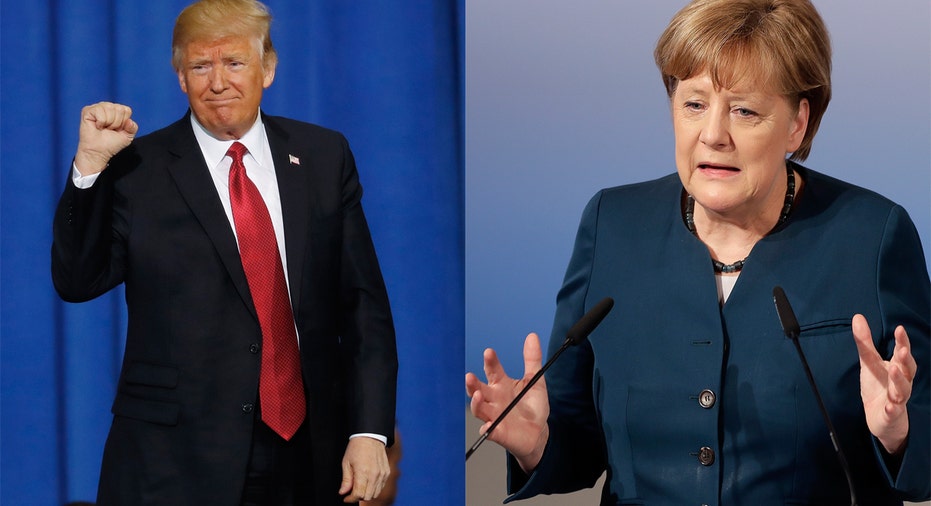Trump Touts Jobs, Jabs Merkel on Trade, NATO

President Donald Trump met Friday with German Chancellor Angela Merkel and a group of prominent CEOs with a vested interest in maintaining a beneficial business relationship between the two countries. The president also used the meeting as an opportunity to criticize international payments to NATO, the majority of which fall short of the target level. He did reaffirm his administration’s commitment to the international organization, while saying it is only fair other countries step up their contributions to meet the two percent target, which Germany currently falls short of.
Despite the NATO jab, the president once again kept the focus on jobs, emphasizing the need to modernize training for America’s workforce, “especially with respect to manufacturing jobs,” which he noted were returning to the country “big league.”
The President lauded Germany’s vocational program as one of the best in the world, saying: “Germany has been a model for highly successful apprenticeship programs. As a result the youth unemployment rate is much lower than other countries.”
Salesforce (NYSE:CRM) CEO Marc Beinoff, Dow Chemical (NYSE:DOW) CEO Andrew Liveris and IBM (NYSE:IBM) CEO Ginni Rometty were among the American executives represented at the White House Friday.
Joe Kaeser, CEO of Siemens - the largest manufacturing and electronics company in Europe - and Harald Krueger, CEO of automaker BMW, accompanied Merkel to the meeting with Trump--which was postponed due a snowstorm on Tuesday.
After the press conference, the pair will touch on some more of the contentious economic issues between the countries, including trade.
“Over lunch the Chancellor and I will talk about our economic partnership. We must work together toward fair and reciprocal trade policies that benefit both of our countries. Millions of U.S. citizens have been left behind by international commerce,” Trump said.
President Trump has promised to tackle America’s mounting trade deficits, reiterating that pledge Wednesday during a speech in Detroit at the American Center for Mobility.
“[Politicians] said [these chronic deficits] helped us win friends abroad. I don't want friends abroad if that's what it's going to take…They don’t like us. They think we’re stupid,” the president said before a group of auto executives, workers and union members.
Trump's “buy American, hire American” agenda could include a House GOP proposed border-adjustment tax; a 20% tariff on goods produced outside the U.S. and sold domestically. The tariff is expected to be among the topics Merkel will bring up during the lunch.
“There are…reports that Merkel will urge against a border adjusted tax and is considering retaliatory tariffs on the U.S.," said Doug Holtz-Eakin, American Action Forum president, in an interview with FOX Business. "In theory, the House Blueprint wouldn’t affect U.S. trade at all, but other details of the House tax plan might.”
Merkel called the U.S. border-adjustment tax a “protective tariff” and has said Berlin would consider retaliating with higher taxes on American businesses, according to Germany’s Der Spiegel magazine.
In 2016, America’s trade deficit with Germany was its fifth largest at more than $64 billion. In January, the U.S. imported a surplus of $4.9 billion worth of goods from the European country when compared to the amount it exported there, according to the U.S. Census Bureau.
Earlier this month the president’s top advisor on trade, Peter Navarro, told a group of economists “Germany is one of the most difficult trade deficits that we're going to have to deal with."
On Friday, Merkel thanked the United States for its contributions to the “economic rise” of Germany.
Germany is the third largest export economy in the world; in 2016 it enjoyed a record surplus of more than 8% of GDP, according to the country’s statistics agency. Last year, the U.S. served as the top purchaser of German goods, importing $114 billion worth of German products, chief among them vehicles and car parts. The proposed U.S. import tax has become a mounting concern for both Merkel, who faces reelection in September, and German business leaders.
German companies have made significant contributions to job creation in the U.S., where Siemens employs 50,000 American workers and BMW’s South Carolina plant, with 8,000 jobs, is the nation’s top auto exporter. BMW says it is directly or indirectly responsible for 70,000 jobs in the U.S.
"During our talks, I informed the President about our operations in the USA: our largest manufacturing plant worldwide is in South Carolina and we are the country’s largest vehicle exporter by value," BMW CEO Harald Krueger said in a statement following the business roundtable.
Trump has been openly critical of automakers, including BMW, which he derided for its plans to build a new $1 billion plant in Mexico. He also criticized German car manufacturers for unfair trade practices in an interview with German newspaper Bild: "How many Chevrolets do you see in Germany? Not too many, maybe none, you can see nothing over there, it's a one-way street.”
The president will also likely discuss a prospective new trade alliance with the German chancellor. The Trump administration is still considering entering into the proposed trade agreement with the European Union, known as the Transatlantic Trade & Investment Partnership (TTIP).



















